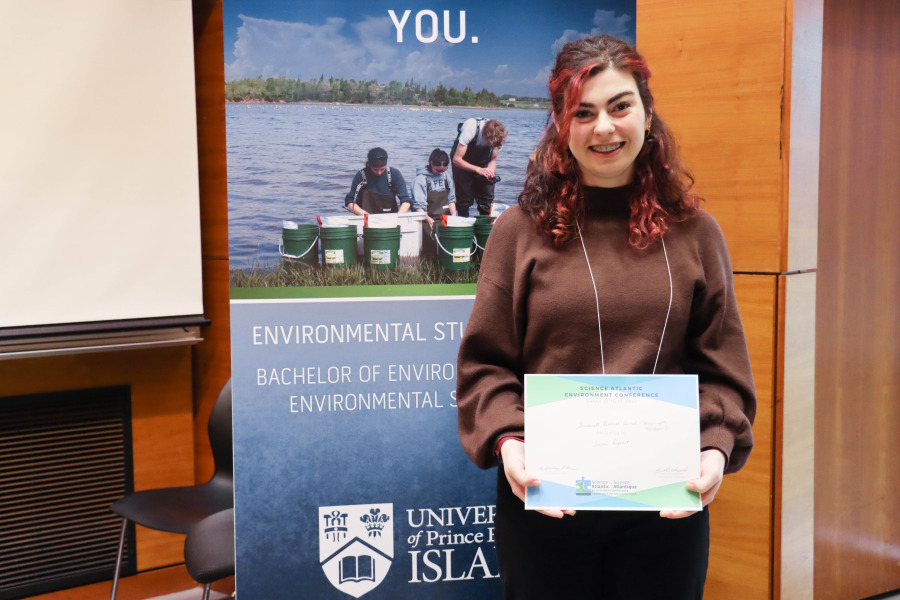With the Bachelor of Environmental Studies degree program at the University of Prince Edward Island you will learn to make environmental connections across academic fields and to analyze environmental challenges we face today. In the classroom, field, and community, you will lead the way in finding innovative solutions—making a positive impact toward sustainability in your personal life, locally and globally.
Environmental issues typically do not respect traditional academic boundaries and require scientific, technical, human and social perspectives to address. As an interdisciplinary liberal arts and science program, the Bachelor of Environmental Studies will provide students with the opportunity to integrate knowledge across faculties of Arts, Science, and Business.
Need more information about Environmental Studies?
The personal information requested on this form is collected under Section 31(c) of the PEI Freedom of Information and Protection of Privacy Act. Read our Disclaimer.
Note: Current UPEI students should refer to Student Planning in myUPEI and the UPEI Academic Calendar governing their entry year, and speak to an academic advisor about course requirements. The course structure presented for this program is a recommended, unofficial progression for prospective students.
Note: As per Academic Regulation 1h, all undergraduate degree programs require successful completion of IKE-1040 (new for students beginning or returning after re-application in Fall 2022); one of UPEI-1010, UPEI-1020, or UPEI-1030, and a Writing Intensive Course.
A student enrolled in the BES will require a total of 120 credit hours or 40 Courses which includes a minimum of 42 credit hours or 14 discipline specific courses with a designation of Environmental Studies (ENV). Of these 14 ENV courses, at least 6 must be at the 3000 level or above, including at least 2 at the 4000 level. There are 5 required core (ENV) courses included as part of the 14 discipline specific courses, one of which requires a 30-hour internship working with a community partner engaged in the environmental field (ENV 3010). There are requirements from the Faculties of Arts, Science, and School of Business. Students are required to choose one of three specializations:
- Environmental Thought and Practice
- Island Environments and Sustainability
- Environmental Innovation and Change Management
Note: Each specialization has specific required courses.
Degree Requirements
All Bachelor Of Environmental Studies (BES) Majors
A total of 120 credit hours or 40 Courses which includes a minimum of 42 credit hours or 14 discipline specific courses with a designation of Environmental Studies (ENV). Of these 14 ENV courses, at least 6 must be at the 3000 level or above, including at least 2 at the 4000 level. There are 5 required core (ENV) courses included as part of the 14 discipline specific courses.
Five Core Environmental Studies Courses (ENV) = 15 Hours Credit
- ENV 1010 - Introduction to Environmental Studies
- ENV 2030 - Societies and Sustainability: Past and Present
- ENV 2040 - Methods of Environmental Inquiry
- ENV 3010 - Environmental Studies Internship
- ENV 4010 - Public Scholars on Environmental Issues
At least nine (9) additional Environmental Studies (ENV) courses = 27 Hours Credit. Please note that these 9 courses can be taken as part of a specialization requirement (see Specializations) or as an ENV elective to fulfil the requirements indicated above.
Required Courses In Other Departments – All BES Majors
- One of UPEI 1010, 1020, or 1030 = 3 Hours Credit
3 Foundational Cognate Courses = 9 Hours Credit (Please note that these courses are required in addition to the other requirements for the BES
- Biology 1010 - Environmental Biology
- Philosophy 3020 - Environmental Philosophy
- Either Sociology 1010 - Introduction to Sociology I OR Anthropology 1050 - Introduction to Anthropology I
1 Course in Statistical Methods = 3 Hours Credit
- Statistics 1210 - Introductory Statistics (or other course with permission of Director) (Note: Please contact the Director if you lack the requirements for university level Math courses)
4 Foundational Courses from Science and Business that fit the following criteria = 12 Hours Credit. Please note that these courses are required in addition to the other requirements for the BES
- 2 Science
- 2 Science or Business
4 Foundational Courses from Arts that fit the following criteria = 12 Hours Credit (Please note that these courses are required in addition to the other requirements for the BES)
- It is recommended that students take 1 Political Science or Economics
- 3 Arts
General Electives
The remaining number of semester hours required to complete the requirements for the Bachelor of Environmental Studies (120 credit hours) will be made up from courses selected by the students.
Writing Intensive Course
- All graduating students at UPEI must include at least one Writing Intensive course as part of their graduation requirements
- Either English 3810 - Professional Writing or Business 2110 - Business Communications are recommended
Students are expected to apply for a particular specialization at the beginning of their second year. However, it is possible for students to declare a specialization until the end of their third year. Please note that ENV courses taken as part of a specialization requirement can be used to fulfil the ENV requirements for the BES.
Environmental Innovation And Change Management Specialization
The specialization in Environmental Innovation and Change Management focuses on learning how to live within the limits of our environment, and develop innovations to manage the interaction of human activities with and upon the environment in a positive way; to challenge the conventional and move organizations, businesses and communities to invoke positive change.
Two Core Specialization Courses = 6 Hours Credit
- ENV 3320 - Environmental Innovation and Change Management Skills
- Either Economics 2110 - Introduction to Resource Economics OR Economics 2150 - Environmental Economics
9 credit hours chosen from the following list OR other course with permission of Director:
- ENV 2240 - Field Course in Ecological Forestry
- ENV 2420 - Society and Natural Resources
- ENV 3510 - Sustainable Community Planning
- ENV 3540 - Environmental Valuation: Theory and Practice
- ENV 4330 - Environmental Communication Strategies
- ENV 4950 - Environmental Studies Symposium
- ENGN 1410 - Sustainability in Engineering Design
- BUS 1410 - Marketing
- BUS 2650 - Introduction to Entrepreneurship and Small Business Management
- BUS 3730 - Tourism Management
- PHYS 2610 - Energy and the Environment
- S/A 3410 - Technology, Society and the Environment
Environmental Thought And Practice Specialization
The specialization in Environmental Thought and Practice focuses on the exploration of the values, attitudes and beliefs of people in relation to the environment in order to provide answers to pressing environmental concerns.
Two Core Specialization Courses = 6 Hours Credit
- Either Psychology 1010 - Introduction to Psychology I OR Psychology 3330 – Ecopsychology
- Sociology/Anthropology 3410 - Technology, Society and the Environment
9 credit hours chosen from the following list OR other course with permission of Director:
- ENV 2420 - Society and Natural Resources
- ENV 2310 - Island Environmental Histories
- ENV 3420 - Environment and Development
- ENV 4110 - Environmental Governance
- ENV 4330 - Environmental Communication Strategies
- ENV 4950 - Environmental Studies Symposium
- ENG 3220 - English-Canadian Poetry
- ENG 3620 - 19th-Century American Literature 1830-1910
- HIST 4830 - History of Environmentalism
- PHIL 2060 - Animal Ethics
- PHIL 2710 - Ethics of Climate Change
- PHIL 3710 - Community-based Ethical Inquiry
Island Environments And Sustainability Specialization
The Island Environments and Sustainability specialization focuses on the diverse characteristics of islands and islanders’ interaction with the environment in order to gain an understanding of lessons for sustainability in all places.
Two Core Specialization Courses = 6 Hours Credit
- IST 2010 - Introduction to Island Studies
- Either POLS 2330 - Political Geography OR ENV 334 - Environmental Stresses on Island Communities
9 credit hours from the following list OR other course with permission of Director:
- ENV 2120 - Earth's Physical Environment
- ENV 2310 - Island Environmental Histories
- ENV 3110 - Understanding Climate Change
- ENV 3210 - Natural Hazards
- ENV 3510 - Sustainable Community Planning
- ENV 4110 - Environmental Governance
- BIO 2220 - Ecology
- BIO 3270 - Field Coastal Ecology
- BIO 3910 - Marine Biology
- BIO 4520 - Biogeography and Macroecology
- BIO 4620 - Watershed Ecology
- SOC 3050 - Population and Society
Requirements for a Minor in Environmental Studies
A minor in Environmental Studies will be recognized when a student has successfully completed 21 semester hours of courses drawn from Environmental Studies courses and cross-listed courses.
These courses must include:
1) Two core introductory Environmental Studies courses (Environmental Studies 1010 and 2030)
2) A minimum of 6 semester hours in approved courses within the Faculty of Science; and
3) A minimum of 6 semester hours in approved courses within the Faculty of Arts; and
4) A minimum of 3 semester hours in Environmental Studies or approved courses within the Faculty of Arts or Faculty of Science
Approved Courses Environmental Studies Minor: Students who do not have the required prerequisites for particular courses that are cross-listed in the Environmental Studies Program are encouraged to consult with the instructors of these courses to seek their permission to enrol. Instructors may choose to admit students to these courses based upon alternative prerequisites that are judged to provide the student with sufficient background preparation for the course.
Faculty of Science
- **Biology 1010 - Current Issues in Environmental Biology
- Biology 1320 - Introduction to Organisms
- Biology 2220 - Ecology
- Biology 3140 - Plant Community Ecology
- Biology 3270 - Field Coastal Ecology
- Biology 3910 - Marine Biology
- Biology 4110 - Principles of Wildlife Biology
- Biology 4520 - Biogeography and Macroecology
- Biology 4540 - Biodiversity and Conservation Biology
- Biology 4620 - Watershed Ecology
- Biology 4650 - Marine Community Ecology
- Biology 4850 - Environmental Toxicology
- Chemistry 2020 - Environmental Chemistry
- Physics 2610 - Energy and the Environment
** Students may only credit either Biology 1010 or Biology 1320 toward their minor.
Faculty of Arts
- Economics 2110 - Introduction to Resource Economics
- Economics 2150 - Environmental Economics
- Economics 3520 - Applied Resource Economics
- English 3220 - English Canadian Poetry
- English 3310 - The Literature of Atlantic Canada
- English 3350 - British Romantic Literature
- History 4830 - History of Environmentalism
- Island Studies 2010 - Introduction to Island Studies
- Philosophy 1020 - Introduction to Ethics and Social Philosophy
- Philosophy 1050 - Technology, Values, and Science
- Philosophy 2060 - Animal Ethics
- Philosophy 2710 - Ethics of Climate Change
- Philosophy 3020 - Environmental Philosophy
- Philosophy 3710 - Community-Based Ethical Inquiry
- Psychology 3330 - Ecopsychology
- Sociology 3050 - Population and Society
- Sociology/Anthropology 3410 - Technology, Society and the Environment
The UPEI Co-op Program is an integrated approach to university education which enables students to alternate academic terms on campus with work terms in suitable employment. The success of such programs is founded on the principle that students are able to apply theoretical knowledge from course studies in the workplace and return to the classroom with practical workplace experience. Students who successfully complete all the requirements of the program will have the notation entered on their transcripts and on the graduation parchment.
Students accepted into the program complete at least three paid work terms of normally 14 weeks duration, and three professional development courses. Credits earned through completion of work terms are counted as general electives.
The Co-op option is available to full-time students in the Bachelor of Environmental Studies program Applications to the Co-op Education Program are normally made after completion of the first year of study. Credits earned through completion of work terms are counted as general electives.
Visit the Co-operative Education Program website for more information.
High School Graduates
Canadian High School Equivalency Chart
Successful completion of Grade 12 examinations in a University Preparatory Program with an overall average of at least 70% (75% for Quebec Secondary V students) in the following subjects:
- English;
- one Social Studies or Language;
- any 3 other academic courses. Grade 12 math recommended.
Note: Grade 12 Math is a prerequisite for some First-year Arts courses.
Refer to the UPEI Academic Calendar for more information.
UPEI's undergraduate tuition is the second-lowest in the Atlantic region, and we offer millions of dollars in scholarships and awards.
Tuition
$6,828 per year, based on 30 credit hours ($682.80 per 3 credit course).
International students pay $8,010 per year in addition to full-time student tuition.
For a complete breakdown of part-time or full-time study as a student in the Faculty of Science, visit our Tuition and Fees page.
Scholarships and Awards
UPEI supports you and your educational goals. We administer millions of dollars in scholarships and awards to our undergraduate and graduate students every year. Depending on your faculty or program, and year of study, you may be eligible for available awards.
Search the complete list of scholarships for information and application forms.
Celebrating Student Achievement
Including Guaranteed Entrance Scholarships and Academic Excellence Awards, these awards recognize the academic achievements of all students who meet the eligibility criteria while studying towards their first undergraduate degree.
Visit the Scholarships site for complete information.
UPEI has about 250 faculty members—exceptional scholars, teachers, and mentors, with more being hired each year as we open new, progressive, and unique programs. But the story isn’t just in the numbers. It’s in the quality of our people. Award-winning faculty from around the globe have made UPEI home. Here, you’ll learn directly from these world-class professors and researchers in small classes where you’ll have easy access to them.









